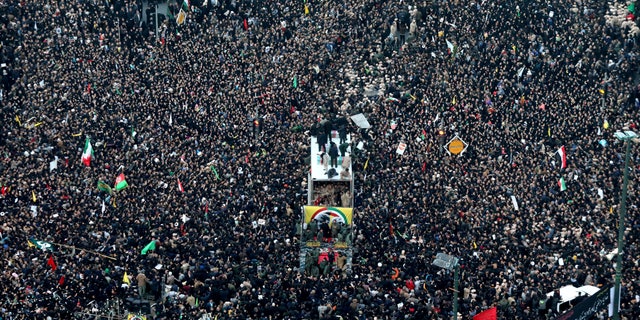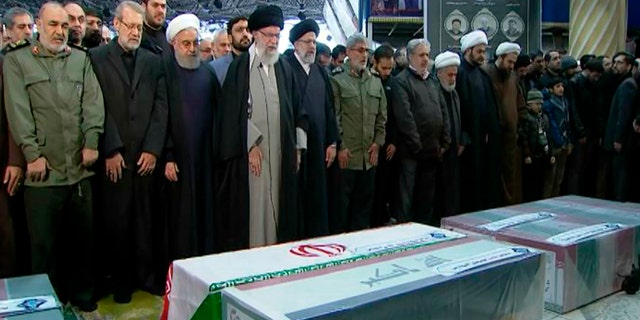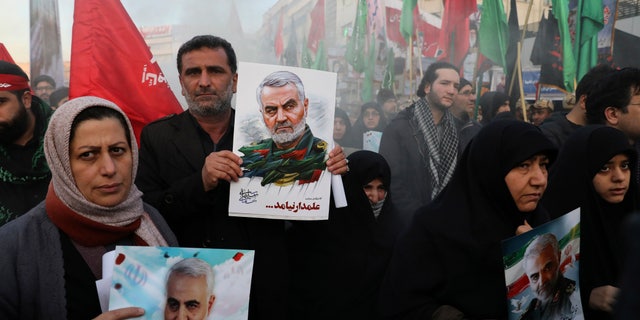This
undated photo released by the official website of the office of the
Iranian supreme leader, shows Maj. Gen. Esmail Ghaani. Supreme Leader
Ayatollah Ali Khamenei later on Friday appointed Qassem Soleimani's
deputy, Maj. Gen. Esmail Ghaani as the new commander of the
Revolutionary Guard's Quds Force. Soleimani was killed in the U.S.
airstrike in Iraq. (Office of the Iranian Supreme Leader via AP)
TEHRAN,
Iran (AP) — A new Iranian general has stepped out of the shadows to
lead the country’s expeditionary Quds Force, becoming responsible for
Tehran’s proxies across the Mideast as the Islamic Republic threatens
the U.S. with “harsh revenge” for killing its previous head, Qassem
Soleimani.
The
Quds Force is part of the 125,000-strong Revolutionary Guard, a
paramilitary organization that answers only to Iran’s Supreme Leader
Ayatollah Ali Khamenei. The Guard oversees Iran’s ballistic missile
program, has its naval forces shadow the U.S. Navy in the Persian Gulf
and includes an all-volunteer Basij force.
Like
his predecessor, a young Esmail Ghaani faced the carnage of Iran’s
eight-year war with Iraq in the 1980s and later joined the newly founded
Quds, or Jerusalem, Force.
While
much still remains unknown about Ghaani, 62, Western sanctions suggest
he’s long been in a position of power in the organization. And likely
one of his first duties will be to oversee whatever revenge Iran intends
to seek for the U.S. airstrike early Friday that killed his longtime
friend Soleimani.
“We
are children of war,” Ghaani once said of his relationship with
Soleimani, according to Iran’s state-run IRNA news agency. “We are
comrades on the battlefield and we have become friends in battle.”
The
Guard has seen its influence grow ever-stronger both militarily and
politically in recent decades. Iran’s conventional military was
decimated by the execution of its old officer class during the 1979
Islamic Revolution and later by sanctions.
A
key driver of that influence comes from the elite Quds Force, which
works across the region with allied groups to offer an asymmetrical
threat to counter the advanced weaponry wielded by the U.S. and its
regional allies. Those partners include Iraqi militiamen, Lebanon’s
Hezbollah and Yemen’s Houthi rebels.
In
announcing Ghaani as Soleimani’s replacement, Ayatollah Ali Khamenei
called the new leader “one of the most prominent commanders” in service
to Iran.
The Quds Force “will be unchanged from the time of his predecessor,” Khamenei said, according to IRNA.
Soleimani
long has been the face of the Quds Force. His fame surged after
American officials began blaming him for deadly roadside bombs targeting
U.S. troops in Iraq. Images of him, long a feature of hard-line
Instagram accounts and mobile phone lockscreens, now plaster billboards
calling for Iran to avenge his death.
But
while Soleimani’s exploits in Iraq and Syria launched a thousand
analyses, Ghaani has remained much more in the shadows of the
organization. He has only occasionally come up in the Western or even
Iranian media. But his personal story broadly mirrors that of Soleimani.
Born
on Aug. 8, 1957 in the northeastern Iranian city of Mashhad, Ghaani
grew up during the last decade of monarchy. He joined the Guard a year
after the 1979 revolution. Like Soleimani, he first deployed to put down
the Kurdish uprising in Iran that followed the shah’s downfall.
Iraq
then invaded Iran, launching an eight-year war that would see 1 million
people killed. Many of the dead were lightly armed members of the
Guard, some of whom were young boys killed in human-wave assaults on
Iraqi positions.
Volunteers
“were seeing that all of them are being killed, but when we ordered
them to go, would not hesitate,” Ghaani later recounted. “The commander
is looking to his soldiers as his children, and in the soldier’s point
of view, it seems that he received an order from God and he must to do
that.”
He
survived the war to join the Quds Force shortly after its creation. He
worked with Soleimani, as well as led counterintelligence efforts at the
Guard. Western analysts believe while Soleimani focused on nations to
Iran’s west, Ghaani’s remit was those to the east like Afghanistan and
Pakistan. However, Iranian state media has not elaborated on his time in
the Guard.
In
2012, the U.S. Treasury sanctioned Ghaani, describing him as having
authority over “financial disbursements” to proxies affiliated with the
Quds Force. The sanctions particularly tied Ghaani to an intercepted
shipment of weapons seized at a port in 2010 in Nigeria’s most-populous
city, Lagos.
Authorities
broke into 13 shipping containers labeled as carrying “packages of
glass wool and pallets of stone.” They instead found 107 mm Katyusha
rockets, rifle rounds and other weapons. The Katyusha remains a favored
weapon of Iranian proxy forces, including Iraqi militias and the
Lebanese militant group Hezbollah.
An Iranian and his Nigerian partner later received five-year prison sentences over the shipment,
which appeared bound for Gambia, then under the rule of dictator Yahya
Jammeh. Israeli officials had claimed the rockets would be shipped to
militants in the Gaza Strip, while Nigerian authorities alleged that
local politicians could use the arms in upcoming elections.
Also
in 2012, Ghaani drew criticism from the U.S. State Department after
reportedly saying that “if the Islamic Republic was not present in
Syria, the massacre of people would have happened on a much larger
scale.” That comment came just after gunmen backing Syrian President
Bashar Assad killed over 100 people in Houla in the country’s Homs
province.
“Over
the weekend we had the deputy head of the Quds Force saying publicly
that they were proud of the role that they had played in training and
assisting the Syrian forces — and look what this has wrought,”
then-State Department spokeswoman Victoria Nuland said at the time.
In January 2015, Ghaani indirectly said that Iran sends missiles and weapons to Palestinians to fight Israel.
“The
U.S. and Israel are too small to consider themselves in line with
Iran’s military power,” Ghaani said at the time. “This power has now
appeared alongside the oppressed people of Palestine and Gaza in the
form of missiles and weapons.”
Now,
Ghaani is firmly in control of the Quds Force. While Iran’s leaders say
they have a plan to avenge Soleimani’s death, no plan has been
announced as the country prepares for funerals for the general starting
Sunday.
Whatever that plan for revenge is, Ghaani likely will be involved.
“That
Qaani survived at such high ranks in the (Guard), and remained
Soleimani’s deputy for so long, says a lot about the trust both Khamenei
and Soleimani had in him,” said Afshon Ostovar, the author of a book on
the Guard. “I suspect he’ll have little difficulty filling Soleimani’s
shoes when it comes to operations and strategy.”
___
Gambrell reported from Dubai, United Arab Emirates.




























